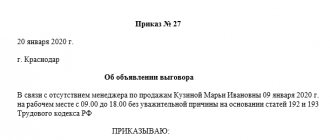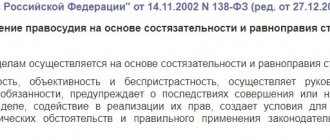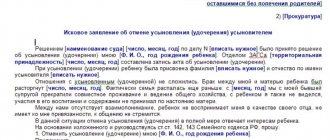If an employee is guilty, but not enough to be fired, this does not mean that his misconduct should go unpunished. There is a special form of responsibility - disciplinary, the function of which is to make a person think about his violation and correct his approach to work in the future. How to properly influence violators of labor discipline, what measures are used for this, what is the procedure for applying disciplinary sanctions, read the article below.
to make a record of a reprimand in the work book (information about work activity) ?
Punishment for wrongdoing
If the manager decides not to fire the offending employee, the law provides him with only two permitted levers of influence:
- remark - the least strict form;
- reprimand is a form of discipline preceding dismissal.
IMPORTANT! The legislation does not allow any lighter or more aggravated forms of disciplinary action, such as “warning of a reprimand”, “reprimand entered into a personal file”, etc.
An exception to this rule is some positions for which there are additional penalties not described in the Labor Code. Civil servants, for example, may receive a warning that they do not fully comply with their position, and customs officers and internal affairs officers, in addition to this, risk being subject to a severe reprimand.
to reprimand an employee for refusing to undergo a mandatory periodic medical examination , and then dismiss him if he refuses to undergo a medical examination again?
What is a severe reprimand and how is it different from a regular reprimand?
The Labor Code does not contain a definition of a severe reprimand, but this form of disciplinary action may be provided for certain categories of employees. In particular, such penalties are applied to employees of the customs service, internal affairs bodies, employees of the prosecutor's office, the investigative committee, military personnel, employees of Russian Railways, notaries and civil servants.
A severe reprimand is considered a more serious form of disciplinary action, from a legal perspective, than a reprimand. That is, he is declared for more serious violations.
But otherwise, it has few differences from a regular reprimand, and the legal consequences associated with a severe reprimand for employees must be spelled out in the employer’s local documentation.
If you want more stringent measures
Alternative measures of influence on guilty employees, not provided for by the Labor Code of the Russian Federation, are unacceptable. For violations of employee discipline, it is not permitted to:
- demote;
- impose a fine;
- reschedule or cancel their vacation;
- withhold part of the salary, etc.
If the labor inspectorate, as a result of an inspection or complaint, reveals any form of punishment for a disciplinary offense, other than a reprimand or reprimand, the employer will receive an order for a serious fine, and the penalty imposed on the employee will have to be removed.
ATTENTION! If money is illegally withheld from an employee as punishment, then upon appeal, the employer will not only be obliged to return it, but also to pay a penalty for the delay in wages.
The only form of punishment more severe than a reprimand and reprimand is the dismissal of the offending employee, if the reason for this is sufficient.
Concept and essence
A severe reprimand is one of the types of punishment provided for in current legislation in relation to certain categories of employees. This punishment is applied in case of violation of labor discipline by an employee or improper performance of his duties.
This measure of influence on the employee is of a moral and psychological nature, without providing for any material consequences.
The essence of the impact is the employer expressing to the subordinate his negative assessment and dissatisfaction with his actions.
The imposition of a severe reprimand has a certain impact on the employee, namely:
- evaluative - consists of expressing a negative assessment of actions;
- preventive - consists of further prevention of possible violations;
- motivational - a reprimand is an incentive for the employee to no longer violate labor discipline.
There are no particular differences between an ordinary and a severe reprimand - the latter measure is simply somewhat more serious and is applied for more serious disciplinary offenses and only in relation to those categories of employees defined by law. In other cases, the usual reprimand is used.
What can you “reprimand” for?
The employer chooses punishment (disciplinary liability) that is appropriate to the offense. There are certain official duties that must be performed properly; non-fulfillment or not fulfilled to the fullest extent and quality is considered a violation. Inaction is also punishable when the job function requires activity. A violation will also be disrespect for the rules of internal labor discipline and routine. It is these forms of behavior that are meant by a disciplinary offense (Article 192 of the Labor Code of the Russian Federation).
Those rules, the violation of which may entail liability, must be documented in the job description, employment contract or internal regulations.
FOR YOUR INFORMATION! The rules written out in the listed documents are binding only if the procedure for familiarizing the employee with them has been carried out, which is confirmed by his signature.
For example, if a person is late for his shift, while the work schedule is posted in the lobby, this cannot be officially recognized as a violation, because no one obliges employees to familiarize themselves with the materials posted on the walls. But if the worker signed the words “I have read the schedule,” the resulting liability will be legitimate.
Reasons for reprimand:
- being late to start work or after a break;
- absence on site;
- refusal to undergo safety training or medical examinations;
- appearing in an indecent state;
- embezzlement, damage, theft of company or employer property;
- failure to comply with management orders;
- violation of labor functions.
The PVTR of the organization established that employees must behave tactfully with the team. If an employee is rude to a colleague, it means he has violated discipline and can be held accountable. View the court decision
Bringing disciplinary action to an employee: how to do it and formalize it correctly
The main reason for bringing an employee to disciplinary liability, as a rule, is his violation of labor discipline.
For this purpose, the Labor Code of the Russian Federation provides for the following types of disciplinary sanctions: reprimand, reprimand and dismissal.
There is a procedure for bringing an employee to disciplinary liability, which is regulated by labor legislation. After establishing the fact of a violation, a report must be drawn up in the presence of two people.
Attention!
To ensure mobile interaction between employees and accounting departments on personnel issues, the 1C:Employee Account service was launched.
In their personal account via the Internet, employees will be able to receive payslips, a 2-NDFL certificate and other documents, and in turn, employees can send a vacation application, notice of absence, advance report, sick leave in electronic form.
Time to discipline the offender
The employer has one month from the day the violation was reported to him to decide whether certain measures are necessary.
If the culprit falls ill during this month or goes on vacation of any kind, these days are added to the period allotted for disciplinary measures. But when additional days of rest are provided by the state, for example, holidays or weekends, the monthly period is not extended for this time.
Two weeks passed between the facts of non-fulfillment of labor duties, but they were revealed almost simultaneously. The employee was reprimanded for the first violation, and the next day he was fired for the second. View the court decision
If the immediate supervisor has not learned about the misconduct for more than six months, no matter what circumstances emerge in the future, the statute of limitations is considered to have passed, and the perpetrator can no longer be reprimanded.
IMPORTANT! The period for detecting a violation is extended to 2 years if the violation was discovered as a result of an audit or audit.
How can you cancel or challenge a reprimand?
If an employee does not agree with the reprimand, or if he simply wants to keep his job, there are several ways to resolve the issue:
- First of all, it can be recommended to contact your immediate superior with a request to cancel the penalty imposed. This can be done at any time, but it is advisable to do it within one year after it is issued, since after this period the reprimand will already be exhausted from a legal point of view. But to do this, the employee needs to actually justify his request. And to do this, it is recommended to prove that the offense was realized, that the employee did everything possible to rehabilitate himself. If the company management deems it necessary, an appropriate order will be issued. Please note that without documentary evidence of the removal of the penalty, the revocation of the reprimand is illegal. The manager himself can initiate the removal of a penalty on behalf of his subordinate. Moreover, an order can be drawn up at any time, even the next day after the order is issued; this is established in Article 194 of the Labor Code of the Russian Federation. The main thing here is that the order to lift the penalty must indicate the basis: the date of issue of the order of reprimand and the date of its ratification. It would not hurt to indicate the reason for this decision.
An order to lift a disciplinary sanction is issued in any form
- You can challenge the reprimand at the labor inspectorate at the place of registration of the enterprise. To do this, it is enough to write a statement indicating the violated rights, provide documentary reasons for canceling the reprimand and restoring labor rights. As a rule, controllers consider a complaint and check all the facts within 15 days. The basis for filing an application may be the absence of a package of documents (evidence) or their inconsistency in the time of registration, etc.
- The employee also has the right to appeal to the authorities for the consideration of individual labor disputes - to the court at the place of residence or at the place of registration of the enterprise.
Video instructions: how an employee can appeal a reprimand
Repented, improved
If a year has passed and no new records of penalties have been added to your personal card, the heavy burden of punishment is automatically removed.
IMPORTANT! If 365 days have not yet passed, and labor discipline is again violated, this may become a legal basis for dismissal.
If the employer decided before the expiration of the one-year period that the employee had reformed (whether he made such a decision himself, or the punished person requested this), the reprimand can be lifted early. To do this, it is enough to issue an appropriate order. After it comes into force, it is considered that the employee has no disciplinary sanctions.
How can an employee appeal a reprimand ?
Legal consequences of a reprimand
So, it was already mentioned earlier that it is not necessary to enter data into the employee’s personal card regarding the imposition of a disciplinary punishment. And even if this is done, during subsequent employment this, as a rule, does not come out (unless the personnel department of the new employer is too lazy to call colleagues at the previous place of work).
This fact is not recorded in the work book either. In this connection, we can conclude that the definition of a separate reprimand does not carry with it any serious legal consequences for a person.
But if an employee still wants to continue working in the company, it is worth focusing on one significant nuance: for example, according to the fifth paragraph of Article No. 81 of the Labor Code of the Russian Federation, an employer can terminate an employment agreement with a person if the latter has committed repeated cases of failure to fulfill official duties (and this documented).
When issuing the first reprimand, the nuance is as follows: the employer, taking into account the legislative norms establishing a period of 1 month for applying disciplinary sanctions, has the right to issue another reprimand to the employee for any labor misconduct within the current month. Consequently, the employing organization will have all legal grounds for dismissal for repeated violations of discipline.
Therefore, having received the first penalty, you need to be especially careful and not violate the employer’s requirements.
It is worth noting here that a reprimand, deprivation of a bonus, and dismissal “for a bad article” also work in the option when the employee, immediately after committing a violation, submits an application of his own free will. The Labor Code provides that the employment contract is terminated strictly after 14 days after the application is sent to the employer. Consequently, violations committed during official employment can be recognized as grounds for termination of the contract, which can be recorded in the labor report even after writing a statement “on your own.”
Disagreement with reprimand
The second way of developing the situation will certainly lead to challenging actions
guidelines in court. An employee who disagrees with the decision has the right to appeal it within three months. To do this, you need a statement describing the circumstances of the case and your interpretation of what happened.
The employer must also be prepared for such a turn of events, but in practice, reprimands, unlike dismissals under an article, are almost never challenged in court. In any case, the presence of documented management actions will reduce the likelihood of the claim being satisfied to zero.
Results
An order to impose any type of disciplinary sanction on an employee, including a reprimand, will have legal force only if it is drawn up within the framework of the algorithm provided for by the Labor Code of the Russian Federation, including:
- preliminary request for an explanatory note (and drawing up a report on its failure to provide it, if necessary);
- publication and signing of the order by the manager;
- obtaining an employee’s signature confirming the fact of familiarization with the order (or drawing up a report on the employee’s refusal to sign the document).
You can familiarize yourself with other nuances of issuing a reprimand and other disciplinary sanctions provided for by the Labor Code of the Russian Federation in the articles:
- “Reprimand as a disciplinary sanction (nuances)”;
- "Disciplinary sanction order - sample and form."
You can find more complete information on the topic in ConsultantPlus. Free trial access to the system for 2 days.
Reprimand under the Labor Code of the Russian Federation
The Labor Code of the Russian Federation provides that a reprimand may be issued to an employee who does not perform or does not properly perform the duties assigned to him. The list of such responsibilities is fixed in the employment contract, service instructions, internal labor regulations, internal documents (orders, instructions) of the administration regulating the functional responsibilities of the worker.
Therefore, before reprimanding an employee, the employer is obliged to follow a certain procedure:
- clearly define the list of functional responsibilities of the employee;
- familiarize him, against signature, with the documents related to his activities (or indicate where he can find them in the public domain);
- prove that a violation actually occurred;
- coordinate reprimands with the trade union organization;
- familiarize the employee personally with the punishment imposed on him.
Keep in mind that one of the functions of a reprimand is to record a violation of labor discipline for the possibility of subsequent dismissal of the employee when the systemic nature of the violations is proven. In this case, consistency will be considered proven if reprimands were issued two or more times for the same type of violations.
Remember, a reprimand is a method of disciplinary action on a specific employee in order to force him not to violate the duties assigned to him, with which the employee was familiarized with when he began his career.
Application procedure
To issue a strict reprimand to a subordinate, the manager must adhere to the following algorithm [/img]
- Recording the fact of committing an offense. This is usually done by drawing up a memo by the violator’s immediate superior addressed to higher management. A report is drawn up regarding the military personnel.
- Sending a notification to a subordinate about the need to provide explanations. It is drawn up in writing and either sent by mail or given to the employee against signature. A special official investigation is also being carried out against military personnel.
- Obtaining explanations from the employee. He is given two working days for this, after which the employer has the right to draw up a report on the absence of an explanatory note. If the document has been provided, the manager examines it.
- Deciding on the application of punishment. The choice of a particular measure is influenced by the specific circumstances of the case.
Issuance of an order imposing a severe reprimand. In addition to the required details (company name, date and place of preparation, name of the document, surname and initials of the official), it also indicates:
- description of the offense that was committed by the subordinate;
- specific circumstances of the case (for example, whether the employee provided explanations or lack thereof);
- the chosen punishment.
It is advisable that after drawing up this order, the employee is familiarized with it, confirming this with his signature. It is worth considering that a reprimand can only be issued within a month from the day the offense was discovered or within six months after it was committed.
For one violation, punishment can only be applied once.
Disciplinary action in the form of a remark: sample application
It is beneficial for the employer that formal discipline is observed in his business, and therefore he tries in every way to keep it at the level he needs.
Various measures are used, such as encouraging punctuality, making it an ideal, sometimes even propaganda posters depicting punctual and responsible people, but in addition, the employer also practices a system of punishments .
Thus, for failure to comply with labor discipline, special measures, called disciplinary sanctions .
Dear readers! Our articles talk about typical ways to resolve legal issues, but each case is unique.
If you want to find out how to solve your particular problem, please use the online consultant form on the right or call. It's fast and free!
What is disciplinary action and how does it happen?
According to the labor code, the owner of a business or his representative can punish his employee in three main ways, these are:
- Comment;
- Rebuke;
- Dismissal.
The degree of severity of these punishments goes in increasing order, that is, a reprimand is the mildest, so to speak, educational influence, and dismissal is the most severe (although it depends on who). A reprimand is something in between, and, as a rule, the one to whom it is given is deprived of a bonus.
In addition to these three penalties, there are other methods, but they are used extremely rarely .
Answer to the question: what is absenteeism under Labor Code and what are the consequences? - read here.
What are the limits of disciplinary penalties under the law?
In our country, the labor code regulates only the types of disciplinary punishments and the procedure for their application and removal, but it does not determine the amount of a particular punishment; this right belongs to the employer.
By law, a business owner can only deprive his employee of a bonus, but in any case he must pay him a salary. He also does not have the right to fine a subordinate, that is, to withhold from him an amount greater than a salary increase.
Each business itself determines the amount of punishment for a particular disciplinary offense, therefore, if at one company a person for being late can only receive a disapproving look from his superiors, at another he may be deprived of bonuses, so it is very important here not to make a mistake with the employer - you need to have at least some idea of who you're working for.
Read about how to protect your rights and file a claim here.
What is the remark?
the remark serves only two purposes - a psychological impact on the employee and the team in order to nip misconduct in the bud, and a set of grounds for dismissal.
in the first case, it is not formalized , the boss simply gives you a “bashing”, and the next day they forget about your disciplinary sanction, but if they took care of you according to all the rules, try not to commit such violations in the future, since after the third reprimand the employer will have the opportunity to fire you.
in most cases, normal employers punish minor violations “humanly,” that is, unofficially, and this is correct, since this approach contributes to the formation of closer relationships between superiors and subordinates, and it is also more profitable for the employer himself - there is no need to bother with evidence and collection procedure.
and since comments usually do not entail deprivation of bonuses, there is no point in messing with it, as is what happens in most enterprises.
but if the employer decides to formalize the reprimand as required, then this can only be done so that in the event of a repeated misconduct, he will have grounds for dismissing the offending employee, because in our country it is impossible to simply fire, at least for now.
procedure for filing a comment
By law, the employer is required to comply with the following formal requirements for imposing penalties:
- A witness to an offense must write a report addressed to the head of the enterprise, that is, report what happened. And the manager, having read it, decides whether it is necessary to proceed with the matter, and if his decision is in the affirmative, he must draw up a special act.
- The act of committing a disciplinary violation must clearly describe the elements of the offense, and it must be accompanied by evidence or references to it, for example, data from CCTV cameras . This act must be signed by the general director and two other responsible persons.
- Next, the act is handed over personally to the employee for review, and he must put his signature and date on it.
- Then the offender is obliged to write an explanatory note addressed to the director and state in it the reasons for his misconduct , then, perhaps, the employer will consider them valid and close the case. By the way, the law does not establish which reasons are valid, and therefore each enterprise owner decides this for himself.
- If, however, the reason, in the opinion of the employer, was disrespectful, then an order is drawn up to impose a disciplinary sanction , which is valid for exactly one year, but the general director can cancel it at any time on his own initiative.
What is the time frame for imposing disciplinary action?
It can be applied no later than 6 months after the fact of the commission of the offense, and this period does not include the time when the employee was on vacation or sick leave, that is, if he was sick for two weeks, then the period for imposing a penalty is 6 months and two weeks.
From the moment the violation was discovered, that is, from the day the report was handed over to the general, no more than a month should pass until the verdict is passed. In other words, if management was dragging its feet and issued an order 32 days after the report was submitted, then such an order is invalid in accordance with Article 193 of the Labor Code of the Russian Federation .
How long does a notice last?
The notice is valid for one calendar year from the date of the order, but it can be canceled if:
- That's what the employer wanted.
- The employee appealed the order and proved its illegality. In this case, the employer is obliged to pay his slandered employee money for moral damages.
After a year, if the employee has not committed any more misconduct, the penalty is canceled, and it turns out that in order to be fired, he again needs to accumulate 3 disciplinary penalties. In other words, in order to be able to dismiss an employee, he must commit 3 offenses in one year.
Information about penalties is not entered into the work book, however, the reasons for dismissal may be recorded there, for example, gross failure to comply with discipline, etc.
Can multiple penalties be applied for one offense?
, only one disciplinary sanction can be imposed for one offense .
If an employee simultaneously committed two or more offenses of a different nature, for example, he was late one day, was harshly rude to a client, and also, say, broke equipment, then these are three different offenses, for each of which separate orders must be drawn up .
Drawing up an order to impose a penalty
The order to put the penalty into effect must be drawn up by a special commission headed by the general director no later than one calendar month after the discovery of the offense, that is, the date of drawing up and transmission to the reception general. director of the memo.
The order is issued in any form if the employee receives a reprimand or reprimand, and in accordance with the T-8 form in the event of his dismissal.
After the order has been drawn up and signed by 2 representatives of the commission, as well as the general, it must be brought to the attention of the employee without fail , which must be confirmed by his personal signature and date. If the order was not brought to the attention of the offender, it is invalid.
Consequences of the remark for the employee
In itself, one remark does not threaten anything , since in Russia disciplinary sanctions do not imply material, criminal or physical liability. No one has the right to fine you, lock you up or beat you with sticks (thank God).
The maximum that the employer has the right to do is to politely reprimand you for making a mistake, thereby motivating you and other employees not to commit such violations.
At the same time, the employer does not have the right to verbally or in writing infringe on your honor and dignity by insulting you, since in this way he falls under administrative liability under Article 5.61 of the Code of Administrative Offenses of the Russian Federation. He can only make a dissatisfied face, but nothing more.
As already mentioned, the purpose of a formal reprimand is to accumulate grounds for dismissal , therefore, if you received this penalty, you should not be afraid of it, but of repeating this offense, or committing a new one, since 3 documented disciplinary sanctions are grounds for dismissal.
Actions of an employee in case of disagreement with the application of a disciplinary sanction in the form of a remark
If the employee is sure that he is innocent or knows for sure that the penalty was carried out in violation of the law, although it was fair:
- He can challenge the order of the general director by contacting the state labor law inspectorate.
- At the same time, he must provide evidence of his innocence or the illegality of the order, or otherwise convince the inspector to conduct an inspection, because if his words are not confirmed, he will have to pay for the services of the experts who conducted the commission.
- The commission can be different, from a simple check of papers to a serious audit , since the detection of violations of labor law is in the interests of the inspectorate, for the simple reason that for each violation the enterprise must pay it a tidy sum.
- In addition, if evidence of an illegal penalty is found, the employee may oblige the employer to pay him compensation for moral damage in court , the amount of which, with the right approach, can reach several monthly salaries.
Removing a comment
How can a notice be removed:
- Firstly, on the initiative of the employer, if he either considered that it would be better for everyone if the matter was hushed up, or he is on good terms with the offender.
- And secondly, if the employee successfully challenges the recovery either directly with the general director or through the court.
In both of these cases, the employer must issue an order canceling the reprimand order , which will cancel it, restoring the employee's good name.
Liability for unlawful reprimand
Wrongful imposition of punishment in the form of a reprimand, if proven in court, threatens the management of the enterprise with administrative liability (Article 5.27 of the Code of Administrative Offenses of the Russian Federation), where liability is imposed on both a specific person and the organization. Individuals pay fines ranging from 1-5 thousand rubles, legal entities - 30-50 thousand.
A fake sick leave certificate is a very high chance of being subject to criminal prosecution. Piece payment for your activities is the best way to pay! You will find out everything in more detail in the material.
Don't you like your “gray salary”? Our article should be very useful to you!









